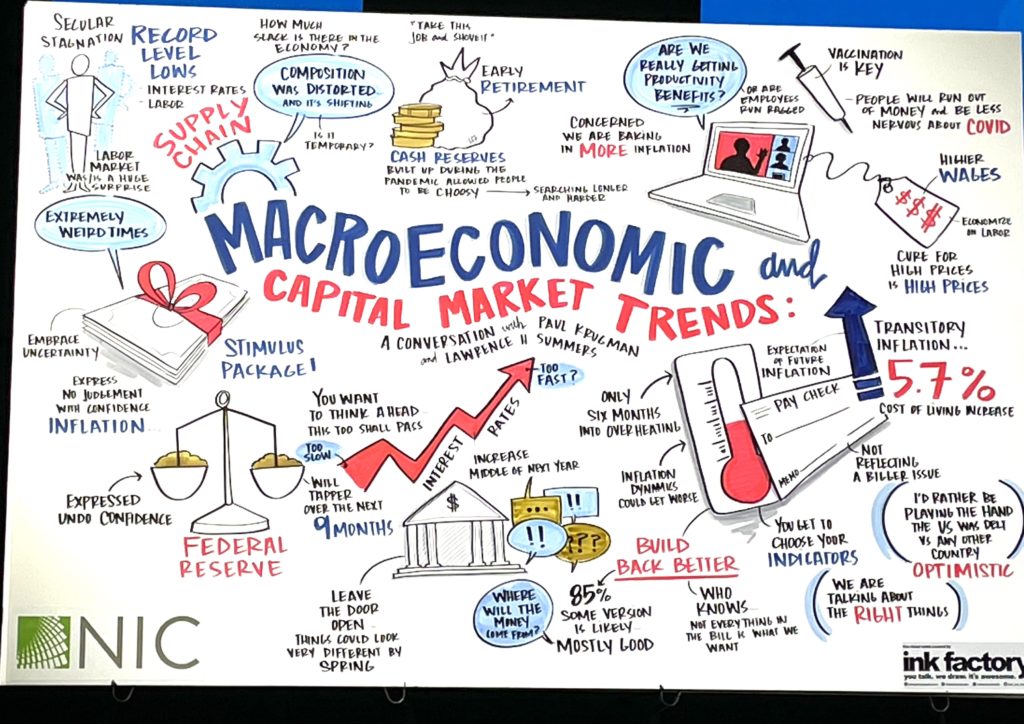
Lawrence Summers speaks during the NIC Fall 2021 Conference. Credit:Tori Sope
HOUSTON—Employers in senior living and care and other industries may see their workforce challenges lessen a bit as some peoples’ savings accumulated over the pandemic dry up and as fear of COVID-19 subsides, former Treasury Secretary Lawrence Summers told attendees of Tuesday’s keynote address at the National Investment Center for Seniors Housing & Care’s Fall Conference.
Other former workers, however, may be enjoying unplanned early retirements and will decide not to return to work, he said. “Not all those people are going to come back out of retirement,” Summers said.
Fellow panelist Paul Krugman, a Nobel Prize-winning economist, said that for many workers, the extra cash they saved during the pandemic has meant that they can be choosier about their next positions.
“But those cash reserves are depleting as we speak, and so we probably are going to see some increase in labor supply,” he said.
That labor supply may come at a cost to employers in the form of increased pay to workers, Summers said.

“I think what’s going to happen is, wages are going to be pushed up, and as wages are pushed up, more people are going to decide they want to work at higher wages,” he said.
Although employers will try to find ways to economize on labor, Summers said, the bonuses they have been offering applicants and employees to interview, refer friends, accept a position or stay on the job for a certain amount of time soon won’t have the desired effect.
“The sense I have is, that stuff is kind of running its course and that there are a lot of people who are saying, ‘We needed to do all of that and we’ve kind of done it and it’s not enough; now we’ve got to raise wages,’ ” he said.
The delay in a wage increase is understandable, Summers said.
“The problem is that if I need to raise the wage $3 an hour to attract an extra person to fill my vacancy, I know that I’m going to have to raise it $3 an hour for all the people I already have,” he said. “And then it gets very, very expensive to fill that vacancy, and so it’s cheaper to live with the vacancy for a while, hoping that you’ll find a way to fill it.”
Vaccination, Krugman said, is “the biggest single solution to everything that’s going on,” because as more people are vaccinated, people become more willing to consume and supply services. “Basically, we have a giant version of you can’t go to the gym so you buy a Peloton instead, and as that starts to go into reverse, a lot of things will get better,” he predicted.
Industry association moves
At another panel discussion Tuesday, industry association leaders discussed moves they are making to help members with labor-related issues.

American Health Care Association / National Center for Assisted Living President and CEO Mark Parkinson pointed to a temporary nurse aide training program created by the association, “where somebody can work in a building without going through all the rigmarole of the normal CNA classes” during the public health emergency.
The program has drawn more than 250,000 participants and netted more than 200,000 people working in long-term care buildings, Parkinson said, calling the program “a complete home run.” Now, AHCA/NCAL is working to be able to extend the program beyond the public health emergency, he said.
The panel discussion, moderated by NIC President and CEO Brian Jurutka, also included American Seniors Housing President David Schless and Argentum President and CEO James Balda.
None of the leaders said they expect comprehensive immigration reform to happen any time soon — “the political divide is just too significant,” Parkinson said. “So we’re looking at some smaller opportunities,” he said.
For instance, AHCA/NCAL, ASHA, Argentum, LeadingAge and some other long-term care organizations are working with the State Department to encourage the speeding up of the visa application process for foreign-trained nurses and other healthcare workers.
Also, AHCA/NCAL recently wrote a letter to the Federal Trade Commission, Parkinson said, “going after the staffing agencies,” which, according to the letter, are “charging supercompetitive prices to desperate LTC centers that simply need workers.” He called the agencies’ actions “unconscionable” and said that the association is planning additional efforts.
Balda pointed to a $6 million federal grant that Argentum is using to create career pathways to try to improve the employee retention rate in senior living among CNAs, nurses and community leaders.
“The premise that we were trying to prove out was that if you create those career pathways and reward individuals as they go up that ladder, so to speak, you can ultimately improve your retention rate” and then can spend less time and money on recruiting new hires, he said.
After the first year of the program, retention rates have improved 85% among participants, Balda said. “Ultimately, we want to get to 7,200 apprentices,” he said. “That’s not going to solve the workforce crisis, but if that can prove out career pathing as a real retention opportunity in the industry, I think that’s a value proposition that we can sell and hopefully compete against other industries, like restaurants and lodging and so forth.”
Another possibility for helping to solve workforce challenges in the industry, Balda said, is the reconciliation bill being negotiated in Washington, which he said contains billions of dollars for workforce development programs in skilled nursing and healthcare.
“Unfortunately, senior living isn’t currently incorporated into that, and so we’re working with everybody here to try to make sure assisted living ultimately gets included as being eligible for those grants based on the definition of long-term care in the Older Americans Act,” he said.
The conference concludes Wednesday.

